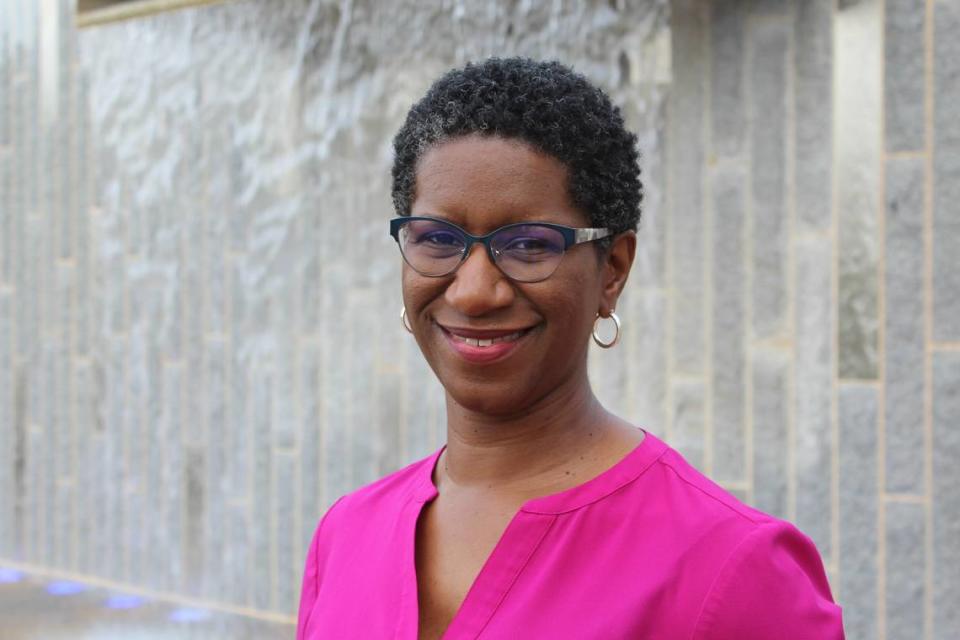ASC president to resign after two turbulent years marked by city arts funding fight
Krista Terrell, president of the Arts and Science Council, announced her resignation Friday after leading the organization through a contentious funding fight with the city of Charlotte. Terrell will leave by the end of the year after two years as president.
She has been involved with the agency for 21 years, and took over as interim president in January 2021. Terrell was appointed permanently to the position in April of that year.
In announcing Terrell’s departure in a news release, the ASC did not cite a reason for her stepping down from the group. The ASC was founded in 1958 as the Charlotte Arts Fund, and serves as a funding pass-through agency for area arts and culture organizations.
Terrell started thinking about the next step in her career in late spring, she told The Charlotte Observer. After 21 years with ASC, she said it felt like it was time to move on, and that nothing happened that motivated her to leave. Terrell said she has to take a step back to know what her next move will be.
“I’m very grateful for the opportunity to have grown in my career here at ASC,” Terrell said. “I’m extremely proud of the work we’ve done over the years but especially under my leadership.”
Terrell also had some advice for her successor: advocate for the cultural sector’s revenue stream. She also said that cultural equity has been a large focus of her tenure, and she hopes for that to continue at the ASC.

Finding a new president for the ASC
ASC’s board of directors will lead the search for Terrell’s successor. Tony Perez, the board’s chair, told The Charlotte Observer that the search will have input from community members across the region.
He added the board of directors has an advisory board including members from multiple municipalities that will play a role in the search.
Perez, in the news release, also praised Terrell’s work at the ASC over the years.
Conflicts during tenure
In early 2021, Mayor Vi Lyles launched the Charlotte City Council’s ad hoc Arts and Culture Committee to develop an arts investment strategy for the city.
From there, Charlotte City Manager Marcus Jones recommended that the city take over arts funding from the ASC, hire an arts commissioner and assemble a board of advisers to develop a long-term plan for arts funding.
That move divided many in the arts community, as well City Council and Mecklenburg County commissioners over the future of arts funding in the region. The county had opted to continue working with the ASC.
The city ultimately established “the Infusion Fund,” a public-private partnership in conjunction with the Foundation for the Carolinas to distribute arts money and hired its first arts and culture officer in 2021.
More controversy came this past February. The ASC released a statement criticizing City Council for approving a policy framework for its Arts and Culture Advisory Board that it said would make ASC “ineligible to receive operating dollars” to support its work.
“ASC has received operating support dollars for the first two years of the Infusion Fund. This decision by City Council changes the course in the final year of the Infusion Fund and goes against a key tenet of its Arts and Culture Advisory Board, which is ‘Do No Harm,’ ” the statement said.
The framework ultimately passed on a 6-3 vote at the February city council meeting.
Members of ASC’s board, the Arts & Culture Advisory Board and local arts groups spoke out at the meeting against the framework, Queen City Nerve reported at the time.
Perez said the city council decision had nothing to do with Terrell’s resignation.
“I think we had to understand, ‘what is our role? ... How do we support other arts organizations?’ ” he said. “It was just a little gray for a little while, I think on both sides, on exactly how that’s going to look. And it’s still a little gray.”
Perez also said he thinks clarity on the council’s role with other arts organizations is the biggest issue facing the ASC.
‘The uncomfortable truth’
Terrell dealt with another hot-button issue early in her tenure as acting president in 2021, when the ASC released a report and apologized for upholding funding practices that perpetuated inequities against minorities.
In the Cultural Equity report, the ASC detailed how its funding decisions led to inequitable support of Black-led and other minority cultural organizations and artists in the region over the years. It also highlighted action it had taken in recent years to remedy those long-held practices.
A couple months later, Terrell wrote a blog post titled, “The Uncomfortable Truth,” which described adverse reactions by unnamed arts groups to ASC’s plans to shift funding to more diverse, small- and mid-sized organizations. The post criticized defensiveness by some arts groups leaders.
“There is great fear with change and the truth, especially playing out in the public realm,” Terrell wrote. “As a Black woman leading a legacy organization, I know I am seen as the manifestation of that fear.”
On the day of her resignation, she echoed the importance of cultural equity to continue beyond her tenure.
“It’s important for us to hold ourselves accountable,” Terrell said, “and have the community hold us accountable as well.”

